Welcome to the week. Here are the most notable stories our writers and readers have come across in the past seven days…
This week’s sponsor is the Vineyard Tour, organized by Umpqua Velo Club. It’s a full weekend of amazing rides and country roads coming Labor Day Weekend, September 1-4th.
Right to repair: Environmental advocates want e-bikes to be simpler to work on and repair, but the bike industry says the risk of fires is too great. But is the industry just looking to protect big bike brands from cheaper competition? The right to repair debate is definitely something to watch. (Fast Company)
Post-Lyft Biketown? Interesting shifts in the bike share business landscape could impact Portland’s system and heightens the need to look beyond private ownership. (Slate)
Post-car era: PBOT is closing one of their underused large car parking garages downtown to save money. Perhaps a more productive use of the space would be some type of shelter? Or secure bike parking? (The Oregonian)
Other obesity epidemic: I’m heartened that every week another large media outlet picks up on the problem of large EVs and the many environmental and safety problems they pose. (The Economist)
Future of cities: This is a good roundup and update on where American cities stand post-Covid, and how we can make sure they thrive going forward. (Vox)
Free for kids: The mayor of Boston has launched an initiative to provide free biking lessons to kids in parks citywide. (WBZ)
Media literacy: Before America kills off yet another threat to the all-powerful automobile, do your homework and learn how to spot bad e-bike articles. (Streetsblog USA)
Colorado’s e-bike rebates: The statewide e-bike purchase incentive program launches this week and Oregonians should watch it closely as it’s a very similar model to what will eventually be passed here. (Colorado Public Radio)
Ticket-hater = ticket-getter: The creator of hit show “The Wire” lambasted NYC’s DOT on Twitter about a speed camera ticket, then it came to light that he’s a repeat offender. (Streetsblog NYC)
Bike Index FTW: A San Francisco man whose bike was stolen in 2018, recently got it back thanks to someone who saw it on Bike Index. (SF Gate)
Thanks to everyone who shared links this week!



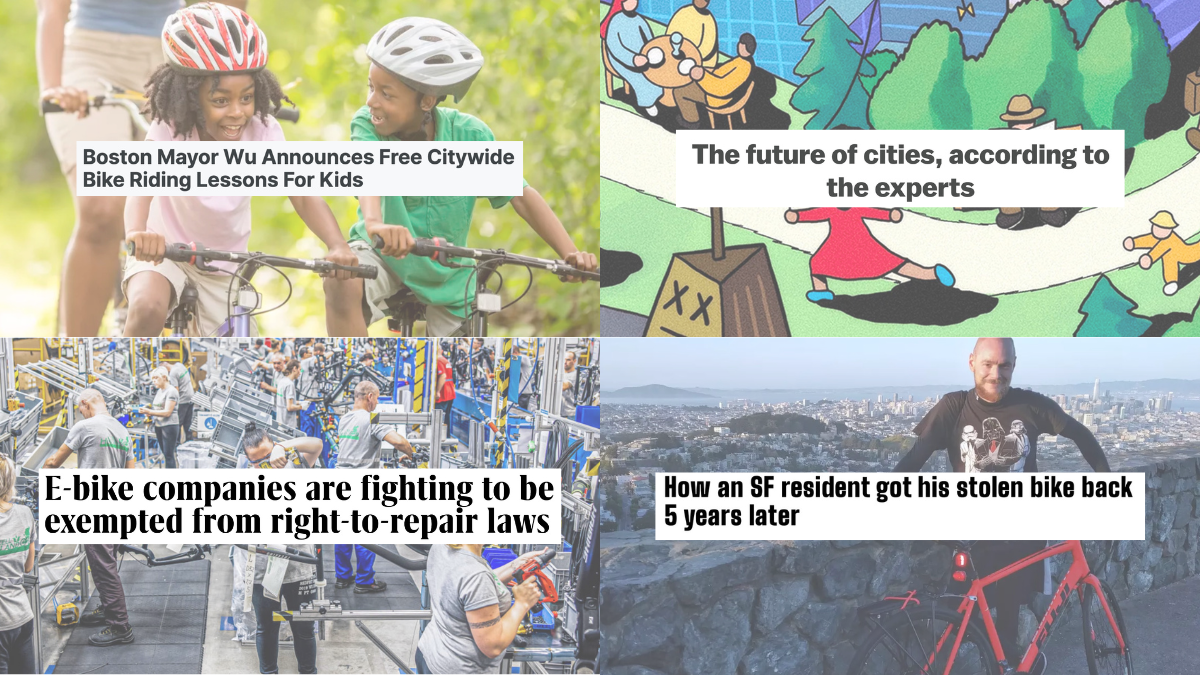

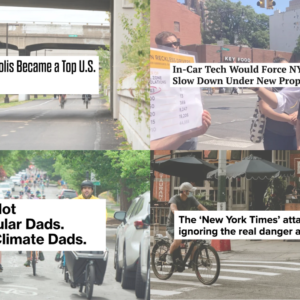
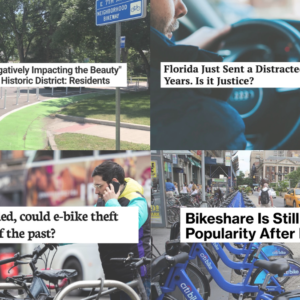
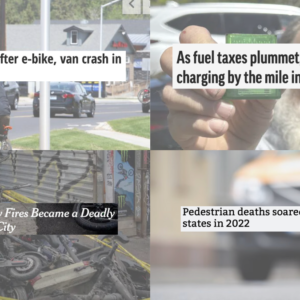
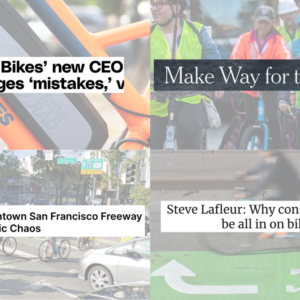
Thanks for reading.
BikePortland has served this community with independent community journalism since 2005. We rely on subscriptions from readers like you to survive. Your financial support is vital in keeping this valuable resource alive and well.
Please subscribe today to strengthen and expand our work.
Extremely disappointing to see People For Bikes lobbying to exempt e-bike manufacturers from entirely reasonable regulation. What good is owning an e-bike if you need to spend money out the wazoo to get it repaired a proprietary shop? It’s nakedly bad for consumers (not to mention the effect on the local bike shops!) and really rubs me the wrong way. People For Bikes, or People For Bike Manufacturers?
Just browsed through their Board of Directors listed on their website and am somehow unsurprised by this result.
If e-bike batteries were built to one industry standard, or perhaps a small number of standards, there would be a virtuous cycle of benefits:
–range would not be such a concern because instead of buying a battery you could buy a battery exchange contract.
–the cost of battery replacement would be spread over time.
–the potential fire hazard from charging powerful batteries in residential buildings could be avoided, and a common argument against e-bike or other micromobility devices would be annulled.
–users would experience less performance loss because charging stations could test and identify battery packs that need service.
–improvements in battery technology would penetrate the market more quickly.
–battery contracts could provide an avenue for user insurance as well as a way to Finance Bike Infrastructure.
Are bike taxes off-topic? You hate it, right? Consider this: if we provide a revenue stream we can reasonably argue for that money to be used for our benefit. If there was a way that I could pay $15.00 a month to leverage investment in development of safe and expeditious bike routes I’d do it in a second.
I can’t believe the amount of crying about the bike sales tax. Here’s what was wrong with that tax: the amount was insignificant, and it was too easily avoided. I’m pissed off about the bike tax because I can’t put money in the pot without buying a whole new bike which is not a thing that I need.
Yes, they are but whatever. I’ll talk about anything
Not sure why you’d assume that, though I generally am a bit skeptical of them. $15/month would be absolutely outrageous, especially if it were levied as a tax.
I can believe the amount of crying about a bike sales tax, it’s Oregon. A state with no sales tax! There are no taxes on purchasing a motor vehicle! It’s absolutely ridiculous that the only sales tax we levy is on bikes.
I’ve got no issues with sales tax in general, but the state of affairs in Oregon specifically makes me not support a sales tax on bikes specifically unless we were to introduce a sales tax writ large. A strange political position maybe, but it’s one born from an even stranger reality.
I certainly agree with the stuff about e-bike batteries though. Not having standardized batteries is extremely bad for all the reasons you listed.
Is it outrageous? I’m not wealthy but $15.00 is discretionary income for me. It’s two microbrews. I’d gladly give up a monthly afternoon at the pub if I could exchange it for a network of practicable bike routes. Not platinum, just solidly mediocre would do.
As a community we’ve decided that $100.00 per month is an alright price for a transit system that wants to be mediocre when it grows up. Fifteen dollars sounds like a bargain compared to that.
We have a network of practicable bike routes. I think they’re better than mediocre, but they’re at least that.
Are you going to finish those beers?
Okay, well when I ride the bus or train there’s a whole slew of specific costs that are obvious. Paying the driver for example! There are functionally no costs associated with riding a bike, which is one of the major benefits of cycling.
What’s more, it’s not really your responsibility for providing the money to build said bike route. Safe bike infrastructure is a public good, and should be funded as such – not that funding should be a huge issue. Portland could build those bike routes you’re talking about for like 0.1% of the yearly state DOT budget. The reason the bike routes of your dreams don’t exist isn’t because cyclists aren’t “paying their fair share” – it’s because the political will doesn’t exist to do it. And it’s pretty ridiculous to imagine charging people $15/month to ride a bike will make it more popular.
If you want those bike lanes to be rideable year round, there are ongoing costs. They’re very low, but present none the less.
I rode through 3 counties and multiple municipal jurisdictions this morning on my commute – and none of them care enough to maintain the bike lanes.
Sure, there are trivial costs to maintaining a bike network (that Portland mostly does a bad job on!). But again, having a safe (and clean) bike network is a public good and the trivial maintenance costs are part of that.
I agree they should do it trust me, I ran into 3 hazards on my trip today that might put a 2 wheeler down. One of the reasons I ride 3 wheels
But what are the realistic costs per mile of bikelane?
Does anyone have hard numbers (maybe from a city that actually takes care of theirs)?
Just want to point out that that there’s absolutely a tax on purchasing a motor vehicle: Oregon Department of Revenue : Vehicle Privilege and Use Taxes : Businesses : State of Oregon
The state taxes dealers, who have the option to pass the cost on to consumers or not, and not all vehicles are taxed that way. The Vehicle Use Taxes are levied only on vehicles bought out of state that will be registered in Oregon.
So I think it’s fair to say its not really a sales tax, though it obviously does have some parallels
https://www.doj.state.or.us/consumer-protection/motor-vehicles/buying-a-vehicle/
A rose by any other name…
I have news for you dealers will charge the 0.005% tax on new vehicle purchases. When I bought a new motorcycle in 2018 the tax was included in the final price. Recently while looking to purchase a used vehicle the dealer added in what they calculated as my share of the CAT (Corporate Activity Tax). As you stated they the option to pas the cost on to the customer, and they will.
Let’s hope Portland is not an example of where the future of cities is heading.
This is needlessly negative, probably time for you to go for a bike ride or do something other than complain online.
There are lots of things that I like about Portland including it’s bike culture and generally reasonable housing laws that will allow the city to become more dense like no parking minimums and allowing ADUs.
It would be a lot better for everyone else (and you too) to funnel your negative energy somewhere better.
Hope you have a great day!
JM, for both the Future of Cities and obesity articles, you have a formatting issue: Instead of bolding them as for the other articles, you have instead made them links to the Right to Repair article.
Ugh. Thanks David. Fixed that.
No no no, do not put a homeless shelter in place of that parking garage. High rise affordable housing, yes. But dt has beared the brunt of enough homeless services clustered in one area – if we have any hope of recovering this neighborhood, a full block homeless shelter smack in the middle of the retail/ hotel district is another well- intentioned idea that would have horrible effects.
Agreed. Also it just encourages more homeless to keep coming here. Many many articles keep showing that people come to Portland because of lax laws, lots of drugs and no enforcement of camp clean ups, etc. We do not need any more incenstive for more homeless, but we definitely can use far more real affordable housing.
Do you have links to those articles? Everything that I find says that’s explicitly not the case (slightly dated article here, and a more dated one here). Those articles are quoting something like 10% to 20% of homeless folks are new arrivals, and are not moving explicitly because of services rather for potential job opportunities or familial/friend connections.
The numbers are way higher based on the last point in time count. I posted a link to that couple weeks ago, but don’t have the means to dig it up now.
Do you recall how “from here” was defined? I would expect that Portland might be a regional attraction – as in if you lived in Beaverton and became homeless you’d probably end up in Portland instead. Would you count that as a “new arrival” to Portland? I don’t really know if I would. Portland does have a disproportionate amount of the regions homeless services, and they are pretty much all clustered in a half mile radius around the corner of Washington and Broadway – which has plainly not been great for the vibrancy of downtown.
In any case, I think these definitional things matter a lot. Someone living in the broader region for a couple years being evicted after losing a job and ending up near downtown Portland is plainly different than bus loads of homeless people coming in from Rapid City
It wasn’t called out specifically, but I got it by subtracting those who were from here from 100%.
Personally, I would count someone from Beaverton as being “from here”. Maybe not someone from Ashland.
I think they don’t. This is a political issue, and the narrative is set by the repeated media profiles of people who moved here for the drugs. I’m sure that’s not the majority, but there’s enough folks like that around that it defines the problem, right or wrong.
They along with the obvious criminals are the face of our homeless problem.
How can you possibly come to an informed decision without aligning definitions on what it means to be “from here”? Of course it’s a political issue – but the facts are still relevant. A media piece that frames 50% of homeless people in the city of Portland as not being from here, while leaving out that 35% of the homeless people in Portland are from the MSA but not the city should be called out as using a misleading definition of “from here”.
Because it isn’t about making an informed decision — we’re not deciding anything. All that matters is political perception, and I think it is pretty well established that facts don’t govern that, at least not directly.
“From here” is a hugely nebulous term. I gave you my definition. You may have a different one.
If we take the number that Will offered, 40% from out of state (still very nebulous), that’s a pretty big number. That generally matches what I recall reading.
I’m talking about you deciding how you perceive the issue, not some policy choice. And political perception ought to be rooted in reality – calling out bad data and reading with a critical eye is actually very important.
Id also say that 40% being born out of state is almost entirely irrelevant to the original stated issue of people moving here specifically to get homeless services, so it doesn’t really matter if it’s big or not.
About 57% of Oregonians aren’t from Oregon originally – and that ratio has held for many decades at this point. 60% of the homeless population in Multnomah County is from Oregon. If folks are moving here “to be homeless” then they’re doing so at lower rates than the average person who moves here for other reasons.
If someone moved here in 2006, lived a stable life for 10 years, then became homeless, they would be both a “homeless person from here” and an “Oregonian not from here”.
You really can’t compare those two numbers.
We’re not “post-covid” at all. Please don’t use that term. The virus is still very much with us. We are post the official emergency, unfortunately, for now anyway.
Covid will NEVER go away. But the emergency is gone, and the Covid impact is gone so yeah, we are def. post-covid.
It would be a bit more accurate to say that we’ve “normalized” covid much like we have the flu, strep and the common cold – get a booster now and again. Many of us now have illnesses like diabetes and heart conditions that we might have gotten later in life anyway, that covid-19 accelerated the process and made our lives miserable all the sooner – but at least I no longer need to wear a mask nor take insulin shots twice a day into my stomach lining. And while my life was turned upside down and I may never be like I was before, on the plus side I’ve been exercising every single day and eating far healthier than I ever have, and I’ve met other covid-19 sufferers who have as well, so there may be some “good” from the disaster too.
For the naysayers who doubt that we as a society can’t change for the better, there was a brief period when we actually did change, for the better, overall, in 2020-21…
You’ve got me curious David, what are some of the things that changed for the better during 20-21? I see you and others are eating better/exercising more which is great, but were there any other positive changes you noticed? Unless you mean it’s good practice for the world to come if the climate crisis comes to us sooner rather than later?
Honestly curious as my experience with that time period was not something I want to see again and yet it still seems to have a hold on us.
My partner’s required diet and medicine was difficult to come by, they couldn’t go anywhere in the early days as we believed the public warnings and didn’t yet know the six feet rule was randomly made up. Work was an insanity of masking, cleaning and having all the office workers stay home while “hands on” people kept working on site. Many of those freed workers took their urban salary and went to rural areas driving up house prices for people who still earned a rural pay. My fave were Oregon gov people who moved to Texas and Florida and then complained they should be reimbursed for flying “home” a few times a year.
Resulting inflation from over spending to keep people home combined with with subsequent increased interest rates and watching savings evaporate with the decline of the dollar.
I could go on, but I’m truly more curious to hear what the change for the better was.
It wasn’t made up. This rule was based on an assumption of droplet transmission. Once there was evidence that 1) people could transmit COVID without symptoms and 2) aerosol transmission could be a major mode of transmission, masking became the primary mitigation recommendation (the recommendation to wear masks occurred very early in the pandemic — 04/03/2020).
I was required by law to wear masks at work and did so throughout 2020, 2021, 2022, and early 2023. It was not a big deal at all (and people would incessantly complain about mask-wearing should just grow the @#$% up).
Ummm, yeah, me too. Or I would have been fired. We were under control of Pierce county so I think it was late 21, early 22 it eased off.
I’m guessing you’ve never done much heavy manual labor in various weather conditions while being under masking protocols?
Please don’t assume your reality is universally shared, you just come across as a whiny child.
Also, remember being warned that Covid masking wouldn’t prevent wildfire smoke inhalation injuries? And smoke particles bigger than Covid?
Covid was real, I had it at least once (verified and not through a home kit), but the mitigation protocols were pretty sketchy.
One of the positive aspects of the pandemic occurred when we effectively closed down our roadway system more or less voluntarily. We did it collectively in a weirdly anti-capitalistic altruistic process more or less alien to most Americans. We stopped going downtown, we effectively stopped driving (though for the record I personally never took it up in the first place), even public transit was no longer used for a time except by the homeless as a warming shelter. Various governments shut down, but several (mostly Republican) states stayed open; lots of sheriffs and police said very publicly that they had no intention of enforcing the closing laws, but most Americans voluntarily took a break anyway.
When I hear from public officials and the chattering class that American’s cannot change their consumer habits to save the planet, we have proof-positive that they can in fact act collectively to do exactly just that, as long as they are fully convinced it’s a “public health emergency” and not necessarily for their own, or for others, good.
Many low-paid American workers, especially at bars and restaurants, were suddenly laid-off; often with no or poor state unemployment compensation, but with a generous federal benefits, to the point that many left the low-wage economy altogether. And they still haven’t returned.
Another was the creation of pop-up protected bike lanes even in otherwise very conservative communities which would never even think of doing it previously, along sidewalkless stroads.
We rediscovered how important cheap and mundane items are for our personal and collective well-being, particularly during the Great American Toilet Paper Crises – remember that? It was my excuse if ever I was pulled over by police while out bicycling during the height of the shutdown – I never was actually was pulled over – but my excuse was that I’m searching for toilet paper. It got a lot of out and exercising while so many others were hibernating.
There was the expansion and institutionalization of Zoom, WebEx, Teams, and other video conferencing platforms by neighborhood associations, community groups, government agencies, and other traditional dinosaur Luddite groups. It’s now the norm.
There was the bike shortage crises when everyone wanted a good used bike; bike parts were lost in transit on containers, including the Evergreen cargo ship stuck in the Suez Canal with REI Ghost bikes on board; and now the bike parts glut and rapid deflation of prices at wholesalers.
“Many low-paid American workers, especially at bars and restaurants, were suddenly laid-off; often with no or poor state unemployment compensation, but with a generous federal benefits, to the point that many left the low-wage economy altogether. And they still haven’t returned.“
Absolutely true and I did forget about that. It was great to see people be able to ditch deliberately under paid jobs and have hope and ability to look for something else. Also nice that many people were able to live the lives of the idle rich at least for a short time and simply enjoy living.
Thank you for the dose of positivity!
Certain folks don’t want covid to be over because the world did not collapse and magically reform into the Socialist Utopia of their dreams. They’re still clinging to the doomerism of summer 2020, when bored mobs roamed Portland maskless, looking for windows to smash. This was going to set it all off, and they were positive that Good would win over Evil.
Pretty silly, looking back at it from a more-or-less normal everyday existence in 2023. I bet most of us have already forgotten half of the businesses, etc. that were lost.
Corporate welfare much? I sure hope this isn’t how an Oregon e-bike rebate program would go down, but then again I have nearly zero faith in our government to anticipate or address any concerns like these.
As I’ve been saying all along, most e-bikes will be scrap metal in a few years when owners discover that their batteries, motors or even proprietary tire sizes (Hi Rad Power!) make repair too costly or even straight up impossible.
The e-bike zealots don’t want you to think about this because there’s a ton of money to be made selling, lobbying, and greenwashing the fad.
I sincerely believe that the gold rush has neared its end. RIP to the millions of 50lb+ overbuilt pokey-wheeled grocery getters that people bought with taxpayer funds, then left to rot in a garage until being dumped on the curb after a handful of rides. We’re so green!
I think you’re overplaying this. I’ve yet to meet an e-bike rider who doesn’t at least use it occasionally. And while I think the proprietary parts, especially for batteries, are hugely concerning (tires are too, but that is a fairly easy thing to avoid by not buying that one model) I think it’s pretty hyperbolic to imagine that most people are tossing their e-bikes after a handful of rides.
You are also just claiming that you are correct about some prior belief, while offering absolutely no evidence other than your own belief.
I own a bicycle shop and sometimes work on Rad bikes customers bring my way. I’m not a fan of the brand, and would rather see rebate programs support better brands, but Rad is the #1 selling e-bike brand in the country, so excluding them could discourage a large portion of the public from adopting an e-bike. I’m not sure how you would expect any e-bike rebate program to not effectively amount to “corporate welfare”, anyway, unless you know of non-corporate companies offering affordable e-bikes.
Rad is the only e-bike brand I know of that uses 22×3 tires, but we can’t even say that is exactly proprietary. While that specific size is uncommon elsewhere, 22×2+ tires have been manufactured for bmx bikes for more than a decade, and are relatively easy to acquire. I also highly doubt 22″ tires will go out of production anytime soon, considering the bicycle industry still makes at least eight different tire sizes for rim sizes that haven’t been used on production bikes for at least three decades, some of them much longer.
Also, I am continuously surprised at how much the average e-bike buyer at my shop uses them. I’ve even had farmers who don’t believe in climate change call me days after buying their e-bike to enthusiastically thank me for my service in setting them up with one. Those who don’t use them much generally sell them to someone that will. Nobody in my 25k community is letting their e-bikes collect dust, let alone dumping them anywhere.
As for the motors and batteries, yes, there’s quite a bit of variety out there. But the most ubiquitous systems today (Bafang, Bosch, Shimano, etc) are already quite refined, so will likely be serviceable and/or replaceable for many years to come.